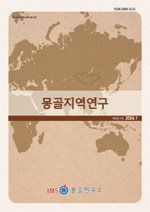학술논문
NOMAD’S PERSPECTIVES: THE CONCEPT OF ANGER IN THE SECRET HISTORY OF MONGOLS
이용수 0
- 영문명
- NOMAD’S PERSPECTIVES: THE CONCEPT OF ANGER IN THE SECRET HISTORY OF MONGOLS
- 발행기관
- 단국대학교 몽골연구소
- 저자명
- Zolzaya Choijin
- 간행물 정보
- 『몽골지역연구』제9권 제1호, 97~113쪽, 전체 17쪽
- 주제분류
- 사회과학 > 지역학
- 파일형태
- 발행일자
- 2024.01.30
4,840원
구매일시로부터 72시간 이내에 다운로드 가능합니다.
이 학술논문 정보는 (주)교보문고와 각 발행기관 사이에 저작물 이용 계약이 체결된 것으로, 교보문고를 통해 제공되고 있습니다.

국문 초록
영문 초록
This study is motivated by the fact the use of metaphors in Mongolian from a cognitive perspective, which is a relatively new idea for Mongolian linguistics. For this reason, this study attempts to propose a proper cultural model to treat emotion concepts in Mongolian and demonstrate how cultural aspects, figurative languages of emotions, and human physiology play active roles in this system of language and culture. Thus, adopting a cognitive linguistic perspective, this study investigates the metaphorical linguistic expressions of emotion concepts in relation to anger Mongolian. Specifically, it examines culture-specific and language-specific realizations of conceptual metaphors for emotions in Mongolian within the CMT framework based on the historical source titled “Secret History of the Mongols”. This current study highlights the importance of culture in understanding the relationship between metaphor, culture, and cognition, and it provides generalizations for the basic emotion concept of anger and gives fundamental explanations in Mongolian. This systematic analysis of emotional metaphors in Mongolian contributes importantly to the major claims of the Contemporary Metaphor Theory, which states that metaphors are grounded on both universal embodiment and social-cultural experiences. Even though English and Mongolian belong to very different language families representing totally different sedentary and nomadic cultures, they share some universal conceptual metaphors for particular emotions with each other. Emotion metaphors are closely related to certain physical aspects of the human body across cultures; however, the speakers of English and Mongolian differ in many ways: differential experiential basis, cognitive preferences, social and physical environments, and the histories of the two nations. Finally, this research summarizes by stating that universal human embodied experiences can be the basis for highly schematic conceptualizations of emotions across cultures. The culture-specific and language-specific mappings and their elaborations are grounded only on cultural embodiment at a specific level in cultures.
목차
Ⅰ. Introduction
Ⅱ. Literature review
Ⅲ. Data Collection
Ⅳ. Results of the Study
Ⅴ. Conclusion
해당간행물 수록 논문
- 몽골지역연구 제9권 제1호 목차
- A study of some examples Transfer Pricing Regulations on Investing Countries in Mongolia
- МОНГОЛ-МАНЖГОГИЙН ХАРИЛЦАА: ХИЛИЙН ХЭЛЭЛЦЭЭР (1935~1941 он)
- ОРОСЫН ХОЛБООНЫ АЛТАЙ УЛСЫН “ЖАНГАР”-ЫН УЛАМЖЛАЛ
- 『몽골비사』의 여성화자 고찰
- “ИХ ЮАНЬ УЛСЫН МАНДСАН ТӨРИЙН ХӨХ СУДАР” ОРЧИН ЦАГИЙН МОНГОЛ УТГА ЗОХИОЛЫН ХЭЛНИЙ СУУРЬ БОЛСОН НЬ
- Монгол болон Өвөр Монгол суралцагчдын өөрийн удирдлага, зохицуулалттай суралцахуйд хийсэн шинжилгээ
- AUTO CAR OWNERS LIABILITY INSURANCE RESEARCH: On the example of Ulaanbaatar city
- NOMAD’S PERSPECTIVES: THE CONCEPT OF ANGER IN THE SECRET HISTORY OF MONGOLS
- TECHNICAL METAPHORS IN MONGOLIAN LANGUAGE DISCOURSE
참고문헌
교보eBook 첫 방문을 환영 합니다!

신규가입 혜택 지급이 완료 되었습니다.
바로 사용 가능한 교보e캐시 1,000원 (유효기간 7일)
지금 바로 교보eBook의 다양한 콘텐츠를 이용해 보세요!





